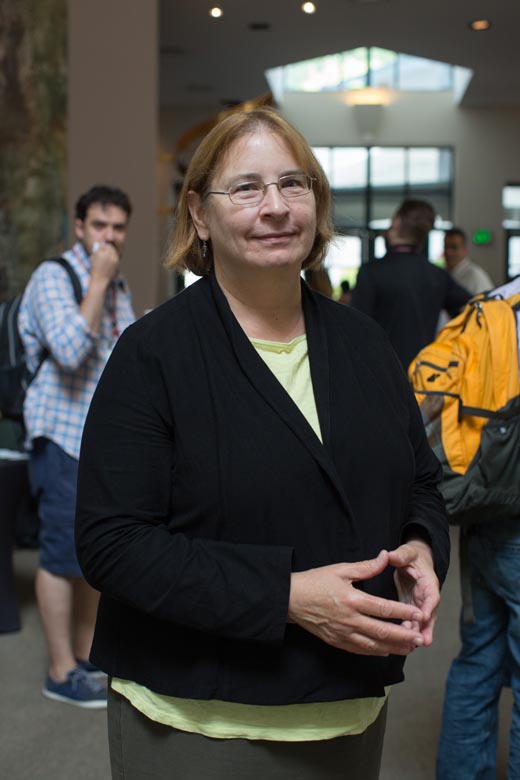Meet Thaysa Tagliaferri of the Federal University of Viçosa (Brazil)! Thaysa is a postdoctoral fellow in Prof. Tiago Mendes’ lab within the Department of Biochemistry and Molecular Biology. She is taking part in the 2020 Genome Engineering: CRISPR Frontiers virtual meeting during which she virtually presented a poster entitled “CRISPR-Cas9 antimicrobial―Resistance reversal potential in challenging conditions.” This is Thaysa’s first CSHL meeting and though “so much information is available and being able to access them from your couch at home was very convenient, [she misses] the personal contact of in-person events.”
Tell us about your research.
My research focuses on the development of an efficient sequence-specific antimicrobial using the gene editing tool CRISPR-Cas9. We evaluate and optimize CRISPR-Cas9 performance when targeting high-copy number vectors and when employed in clinical bacterial isolates.
How did you decide to focus on this area/project?
I have been working with antimicrobial resistance pathogens since my MSc. During that time, I attended the iGEM competition where CRISPR-Cas was a hot topic. This opportunity inspired me to connect this technology with my supervisor’s research line (antimicrobial resistance). Even with no previous experience with CRISPR-Cas, we challenged ourselves in learning more about this promising field and this eventually became my PhD topic. We were hopeful to contribute to alternative treatments in view of antimicrobial resistance sharply increasing levels. Figuring out how CRISPR-Cas behaves in challenging conditions paves the way for better understanding its impact in a hypothetical clinical scenario.
What and/or who is the inspiration behind your scientific journey?
I’ve always been a curious individual, and my curiosity has always led me to seek answers and acquire new knowledge. To me, this is the core of science, being able to minutely understand how the world works and to be able to contribute to the development of society throughout the journey. My family has also served as a great personal inspiration. All the effort they’ve put into my education helped me get where I am today.
What impact do you hope to make through your work?
Antimicrobial resistance is a public health problem leading to millions of deaths every year worldwide. I hope my work progresses CRISPR-Cas against this fight. This means raising new research questions in the field, and stimulating new researchers to join such an important and fascinating area and help us achieving results that will ultimately benefit humans.
What do you love most about being a researcher?
I love the multifaceted aspect of science: bench work, experimental design, results analysis, writing, drawing, oral presentations, teaching, scientific communication and so many other different areas we can explore! All of the above make it impossible to find science boring and they allow us to test new hypothesis that could significantly contribute to societal development.
What drew you to attend this meeting?
I’m really fascinated about the versatility of CRISPR-Cas techniques and the avenues it has opened in science. This meeting is a great opportunity to stay up-to-date with recent developments in the field and its application in different areas, including against COVID-19.
What is your key takeaway from the Meeting; and how do you plan to apply it to your work?
The extraordinarily fast pace in which CRISPR-Cas develops, and the fact that there is still so much to explore! I became inspired by different methodological strategies that I’m definitely going to try and implement in my future projects.
What feedback or advice would you share with someone considering to participate in this meeting?
The organization team has done an amazing job to minimize the drawbacks that an online conference may cause. Several communication channels were created, meetings with the speakers were carried out, and all posters were made available. This was such a great event! My advice is this: get familiar with all tools they offer, and you will be able to extract and enjoy the most out of it.
What’s the most memorable thing that happened during the Meeting?
If I may cite two memorable moments, I would first highlight the tribute to Rosalind Franklin, which acknowledged her groundbreaking contribution to science and to genome editing. The panel discussion around the COVID-19 also deserves mention as it included CRISPR-Cas based diagnostics for SARS-CoV-19 detection and the importance of massive testing for containing the virus spread, which was incredibly relevant given our current situation.
Thank you to Thaysa for being this week's featured visitor. To meet other featured researchers - and discover the wide range of science that takes part in a CSHL meeting or course - go here.
Image provided by Thaysa Tagliaferri






